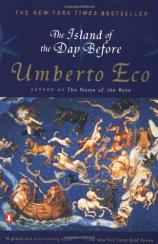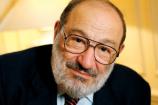Reading Group Guide
Discussion Questions
The Island of the Day Before

1. Roberto is naive, impressionable, impulsive, loyal, honest, and self-deluded. What do you think of him as a hero of the story? Is he an everyman? Do you think Eco wants the reader to identify with Roberto?
2. Eco describes Roberto as absorbing knowledge "as if he were a sponge, and was not distressed at believing in contradictory truths. Perhaps it was not that he lacked a taste for system; his was a choice." What does Eco mean by this? What do you think of Roberto's various teachers – Saint-Savin, Padre Emanuel, Salazar and Saletta, Father Caspar – and the way Roberto acquires and uses his knowledge?
3. What do you make of Ferrante, Roberto's imagined brother? How do his escapades shape and move the story along? Do you think Eco is making a point about the creative process? The imagination's vital role in our lives?
4.Roberto becomes the willing disciple of a number of teachers but takes much of what they say at face value – learning, as it were, in a vacuum. Yet, once stranded on the ship, he must put his own intellect to use. What is Eco telling us about knowledge gained through intuitive versus empirical reasoning?
5. In matters of romantic love, Roberto is a naive but willing pupil. What do you think of the advice he is given on how to win the hearts of the women he desires? How real is his devotion for Lilia, a woman he doesn't really know?
6. Eco claims that all his novels are detective stories. How does he present this novel as a mystery? Is there a resolution? Is it satisfying or frustrating that Roberto never reaches the island?
7.How does Eco's use of comedy – e.g., in the battle scenes during the siege of Casale; in the way Roberto pursues romance; and during his attempts to construct the Instrumentum Arcetricum with Father Caspar – offset the more sober issues of war, love, and science?
8.When asked about the multiple layers of meaning and obscure references found in his work, Eco, in a 1995 interview, likened his novels to "club sandwiches.... You can decide to eat only one part." His apparent meaning is that a reader can appreciate many different facets of his books, that a reader need not be a scholar to "get" the meaning. What layers of this particular sandwich are most effective? Why?
9. How does Eco pit science against nature in the novel? What do you think of the many devices his characters invent – are they technological advances or foolish attempts at understanding and gaining control over their world?
10.Father Caspar argues that he – rather than Roberto – should attempt to reach the island. "After all, I have the faith, and you not.' Roberto understood that this was not by any means the last consideration: it was the first, and surely the most beautiful." Yet Father Caspar's last invention – and his mission – are fatally flawed. What do you think Eco is condemning?
11. Why does Eco dedicate an entire chapter to the explication of the Orange Dove? What meaning does this symbol have to the story and to Roberto, stranded, alone, and with little hope for survival?
12. Roberto is within sight of an island he can't reach – physically, because he can't swim, and theoretically, because the island exists the day before and he can't go back in time. What do you think the island's real and imagined inaccessibility stands for in the novel? How does Roberto's desire to reach the island compare with that of Father Caspar?
The Island of the Day Before
- Publication Date: November 1, 1996
- Mass Market Paperback: 514 pages
- Publisher: Penguin (Non-Classics)
- ISBN-10: 0140259198
- ISBN-13: 9780140259193








